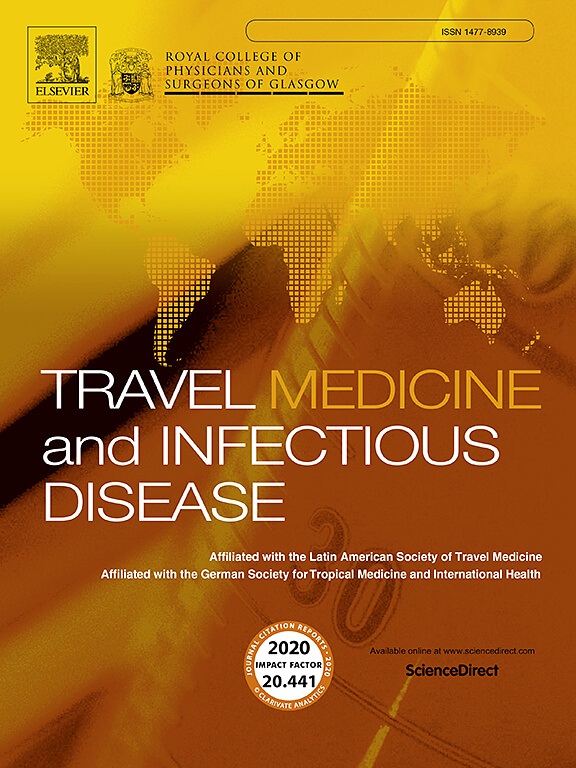在德国汉堡,撒哈拉以南非洲“探亲访友”旅行者对疟疾风险的认知和有效预防的障碍
IF 4.7
3区 医学
Q1 INFECTIOUS DISEASES
引用次数: 0
摘要
全球北部的非洲探亲访友群体在前往撒哈拉以南非洲旅行时感染可预防的旅行相关感染(包括疟疾)的风险很高。这项研究旨在评估妨碍有效预防的障碍,并制定有针对性的旅行咨询服务。方法于2023年1月至8月在汉堡机场对从非洲疟疾流行目的地返回的撒哈拉以南非洲成年VFR旅行者进行问卷调查,评估其疟疾风险认知、预防和咨询态度以及旅行药物和疟疾预防经验。结果共有389名参与者完成了调查。其中67%(261人)表现出对疟疾传播的充分了解。51% (n = 198)的人认为在疟疾流行的国家感染疟疾的风险最小,因此采取预防措施的人数较少。10% (n = 37)的人错误地认为他们接种了疟疾疫苗。大约一半的答复者在出发前没有寻求医疗旅行咨询,也没有采取抗疟疾预防措施,因为他们认为患病风险很小。在服用抗疟药物的患者中,77% (n = 149)完成了整个疗程。返回时,5% (n = 20)的答复者有类似疟疾的症状,其中55% (n = 11)自行用药或未寻求治疗。结论svfr旅行者错误地认为疟疾风险较低,导致其对旅行医疗建议和化学预防的接受程度较低。发现对医疗保健提供者建议的不信任。这项调查的见解对从业人员和旅行医学诊所很有价值,可以为VFR旅行者提供更有针对性和文化敏感性的旅行建议。本文章由计算机程序翻译,如有差异,请以英文原文为准。
Malaria risk perceptions and barriers for effective prophylaxis among sub-Saharan African 'visiting friends and relatives' travellers in Hamburg, Germany
Background
The African visiting friends and relatives (VFR) community in the Global North is at high risk of contracting preventable travel-associated infections including malaria when travelling to sub-Saharan Africa. This study aimed to assess barriers to effective prevention and to develop tailored travel counselling.
Methods
A questionnaire-based survey was conducted from January to August 2023 at the Hamburg Airport among adult sub-Saharan African VFR travellers returning from malaria-endemic destinations in Africa to assess malaria risk perceptions, attitudes towards prophylaxis and counselling and their experiences with travel medicine and malaria prophylaxis.
Results
A total of 389 participants completed the survey. Of these, 67 % (n = 261) demonstrated adequate knowledge of malaria transmission. Fifty-one percent (n = 198) perceived minimal risk of contracting malaria in the malaria-endemic country leading to lower uptake of prophylaxis. Ten percent (n = 37) mistakenly believed they were vaccinated against malaria. Approximately half of the respondents did not seek medical travel advice prior to departure or take antimalarial prophylaxis due to perceived minimal risk of disease. Of those who took antimalarial drugs, 77 % (n = 149) completed the full course. On return, 5 % (n = 20) of the respondents had malaria-like symptoms and of these, 55 % (n = 11) either self-medicated or did not seek medical treatment.
Conclusions
VFR travellers mistakenly perceive a low risk of malaria, resulting in low uptake of travel medical advice and chemoprophylaxis. Mistrust of advice from healthcare providers was found. Insights from this survey are valuable for practitioners and travel medicine clinics to provide more tailored and culturally sensitive travel advice to VFR travellers.
求助全文
通过发布文献求助,成功后即可免费获取论文全文。
去求助
来源期刊

Travel Medicine and Infectious Disease
PUBLIC, ENVIRONMENTAL & OCCUPATIONAL HEALTH-INFECTIOUS DISEASES
CiteScore
19.40
自引率
1.70%
发文量
211
审稿时长
49 days
期刊介绍:
Travel Medicine and Infectious Disease
Publication Scope:
Publishes original papers, reviews, and consensus papers
Primary theme: infectious disease in the context of travel medicine
Focus Areas:
Epidemiology and surveillance of travel-related illness
Prevention and treatment of travel-associated infections
Malaria prevention and treatment
Travellers' diarrhoea
Infections associated with mass gatherings
Migration-related infections
Vaccines and vaccine-preventable disease
Global policy/regulations for disease prevention and control
Practical clinical issues for travel and tropical medicine practitioners
Coverage:
Addresses areas of controversy and debate in travel medicine
Aims to inform guidelines and policy pertinent to travel medicine and the prevention of infectious disease
Publication Features:
Offers a fast peer-review process
Provides early online publication of accepted manuscripts
Aims to publish cutting-edge papers
 求助内容:
求助内容: 应助结果提醒方式:
应助结果提醒方式:


